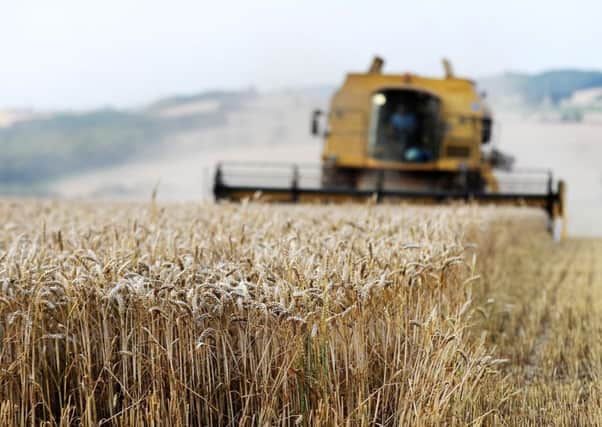Fears of fresh rural payments fiasco amid IT system switch


Politicians and farmers in rural Yorkshire have voiced deep concern over the Government’s decision to make applications for European subsidies – via the heavily criticised Rural Payments Agency (RPA) – “digital by default” from 2015, meaning paper applications may no longer be accepted.
In evidence published by the Commons environment committee, a senior Government official sought to dismiss concerns that many farmers do not have access to good-quality internet in their local area and suggested they each go out and purchase their own satellite broadband links.
Advertisement
Hide AdAdvertisement
Hide AdIt was also revealed the RPA will be introducing another new computer system to process the next round of EU payments from 2015, despite the catastrophic failures last time round.
Committee chair Anne McIntosh, the Conservative MP for Thirsk and Malton, said the plan had clear echoes of the RPA fiasco of 2005, when vital subsidies were delayed because of IT failures.
“This is where it went very badly wrong in 2005,” Miss McIntosh said, after hearing claims from officials at the Department for Environment, Food and Rural Affairs (Defra) that the new computer system would offer significant improvements.
“This is precisely what the previous committee was told in 2003, 2004, 2005 and 2006 – that we were going to have this very easy-to-use and simple system, which was all-singing and all-dancing. It absolutely crashed on day one.
Advertisement
Hide AdAdvertisement
Hide Ad“I think we are going to take a lot of persuading that that is not going to happen this time.”
The Single Payment Scheme for EU subsidies, introduced in 2005, was one of the biggest public administration fiascos of the New Labour years. Farming businesses teetered on the brink of collapse after being left waiting for vital EU funding, and countless under- and overpayments continued for the subsequent years to 2010.
A National Audit Office report in 2009 accused the RPA of having “scant regard for public money”, and revealed the Government paid out £500m in fines to the European Commission as a result of the multiple failures.
The powerful Commons public accounts committee branded the RPA’s handling of the scheme a “masterclass of maladministration”.
Advertisement
Hide AdAdvertisement
Hide AdThe blame was placed squarely on the RPA’s decision to introduce a complex new IT system at the same time the new payment scheme was introduced.
Harry Cotterell, president of the Country Land and Business Association (CLA) said the RPA’s performance has been transformed over recent years, and that it was vital the mistakes of the past are not repeated. “The priority initially must be to get the IT system absolutely right,” he said.
But farmers’ representatives warned that for many landowners, even being able to access the new system online is unrealistic.
George Dunn, chief executive of the Tenant Farmers’ Association, said: “A big concern for us is the Government’s drive to digital communications.
Advertisement
Hide AdAdvertisement
Hide Ad“We are quite happy to encourage our members to go for the digital solution. [But] frankly, there are a large number of individuals who will not be able to make the transition, and they should not be penalised because of that.”
Mr Dunn said the option for farmers to apply on paper must be left open, “particularly in situations where broadband connections are pretty poor, or they do not have the skills to do that”.
George Winn-Darley of the Moorland Association for the North York Moors confirmed: “Digital by default is going to be a challenge for those in rural areas who have not yet got adequate broadband coverage.
“I echo what Mr Cotterell said - the IT must be fit for purpose.”
Advertisement
Hide AdAdvertisement
Hide AdThe Government has committed to rolling out superfast broadband to most of the country over the next few years. It is poised to miss its original target of providing 90 per cent coverage across the UK by 2015, however, and has replaced it with a new target of 95 per cent by 2017.
Jim Bailey of the North York Moors National Park Authority, warned there was still no plan to reach the most rural parts of the country, where many farmers live.
“Nobody is prepared to pick up that last five per cent,” he said.
But Ian Trenholm, Defra’s chief operating officer, said: “The computer system we currently have is very old and needs replacing,” he said. “We are taking the opportunity to replace an outdated computer system with a state-of-the-art computer system that will be both cheaper to put in and cheaper to maintain.”
Advertisement
Hide AdAdvertisement
Hide AdMr Trenholm said the department had learned the lessons of 2005, and was testing the new system with farmers – using a range of different internet speeds – before it is introduced in 2015.
“We are sitting down with farmers in their offices and at their kitchen tables, rehearsing through the system with them,” he said. “We are starting much, much earlier than was ever the case before.”
He said 80 per cent of farmers already apply for their payments online, and that the department was planning to introduce a “digital assistance” scheme for those unable to do so in 2015.
“That may very well be the option to submit on paper – but, more likely, we would encourage them to use an agent or some other person to assist them,” he said.
Mr Trenholm claimed individual farmers unable to get broadband could pay £99 plus a £15-a-month contract to receive satellite broadband on the farms.